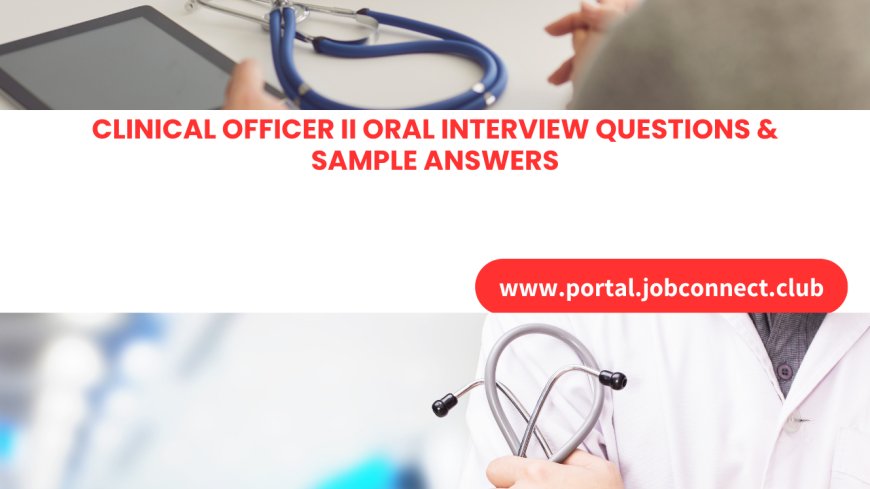Clinical Officer II Oral Interview Questions & Sample Answers
Prepare for your Clinical Officer II interview with this detailed list of oral questions and model answers, covering clinical management, contraindications, diagnostics, and patient care.

Interview Questions & Sample Answers:
-
Explain yourself including your background history and professional experience.
Answer:
"I hold a diploma in Clinical Medicine from [Institute]. I have worked in [district hospital/clinic] providing outpatient and inpatient care, managing emergencies, and collaborating with multidisciplinary teams." -
What are the contraindications of gastric lavage?
Answer:
"Contraindications include ingestion of corrosive substances, hydrocarbons with high aspiration risk, unprotected airway, and late presentation beyond 1 hour post ingestion." -
How do you assess a patient presenting with acute abdominal pain?
Answer:
"Take history, perform physical examination, order relevant investigations like ultrasound or blood tests, and determine need for surgical referral." -
Explain the steps in managing a patient with hypertensive emergency.
Answer:
"Immediate blood pressure reduction with IV antihypertensives, monitoring organ function, and addressing underlying causes." -
Describe how you would manage a diabetic patient with hypoglycemia.
Answer:
"Administer oral glucose if conscious; if unconscious, give IV dextrose or glucagon, monitor vitals and blood sugar." -
What are the common causes of chest pain in your clinical setting?
Answer:
"Myocardial infarction, angina, pneumonia, musculoskeletal pain, and gastroesophageal reflux disease." -
Explain the procedure for inserting a urinary catheter.
Answer:
"Ensure asepsis, select appropriate catheter size, lubricate, insert gently into urethra until urine flows, inflate balloon, and secure catheter." -
How do you handle a patient with suspected stroke?
Answer:
"Stabilize airway, breathing, and circulation, perform neurological assessment, arrange urgent imaging, and refer to higher facility." -
What are the essential components of a physical examination?
Answer:
"Inspection, palpation, percussion, and auscultation." -
How do you counsel a patient newly diagnosed with HIV?
Answer:
"Provide emotional support, explain the disease, treatment importance, prevention, and encourage disclosure." -
Explain the importance of infection prevention and control in clinical practice.
Answer:
"Prevents disease transmission, protects patients and health workers, and ensures safe clinical environment." -
What are the signs of dehydration you assess in a clinical patient?
Answer:
"Dry mucous membranes, sunken eyes, decreased skin turgor, low blood pressure, and tachycardia." -
How do you manage a patient with suspected malaria?
Answer:
"Perform rapid diagnostic test or microscopy, administer antimalarials per protocol, and monitor clinical progress." -
Describe how you would perform cardiopulmonary resuscitation (CPR).
Answer:
"Ensure scene safety, call for help, check responsiveness and breathing, start chest compressions at 100-120/min, provide rescue breaths, and continue until help arrives." -
What is your approach to managing pediatric patients?
Answer:
"Use age-appropriate communication, involve caregivers, adjust drug doses, and closely monitor growth and development." -
How do you document patient progress?
Answer:
"By writing daily notes, recording vital signs, treatments, investigations, and response to therapy." -
What ethical principles guide your clinical practice?
Answer:
"Confidentiality, informed consent, beneficence, non-maleficence, and justice." -
How do you handle medical emergencies in a resource-limited setting?
Answer:
"Prioritize stabilization, use available resources creatively, and arrange prompt referral." -
Explain the importance of teamwork in clinical settings.
Answer:
"Enhances patient care quality, shares workload, and improves decision-making." -
How do you maintain your professional development as a Clinical Officer?
Answer:
"Attend workshops, read journals, participate in case discussions, and pursue further education."